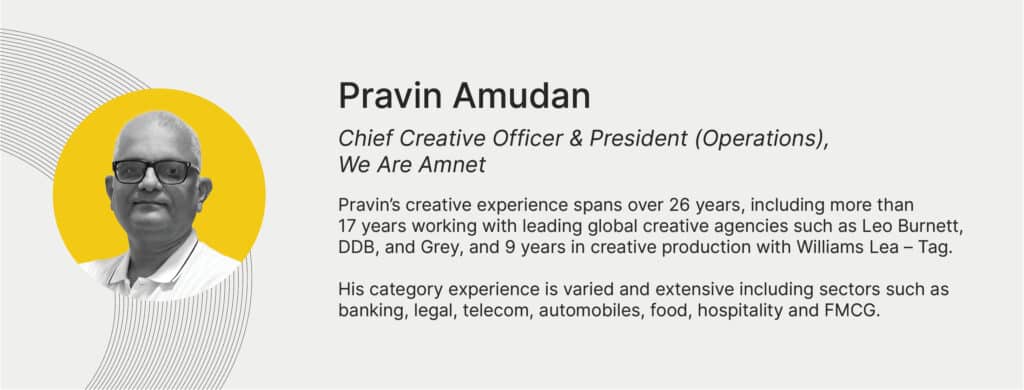It has been a little over two and a half decades in the creative business, but I vividly remember that Sunday morning at a swanky beach resort in Mumbai’s Madh Island. We were a group of 40+ young creatives working for a reputed advertising agency, attending a weekend workshop conducted by some of the best minds in the creative business.

One session had a very profound impact on me that day. The gentleman opened his talk with a sweeping statement – a Nostradamus-type prophecy!
‘80% of you in this room will stagnate in your careers.’
And then he went on to explain why.
The initial reaction from most of us in that room was that of shock and disbelief. For the rest of the session, in between absorbing all the creative wisdom that was being shared with us, I would keep scanning the room, looking at each one of those brilliant creative minds at the table. Exceptionally talented and hard-working, some of them were my peers and some of them my seniors. I found it really hard to digest that 80% of us in the room that day, would actually stagnate.
By the end of the workshop, I had dismissed his statement, likening it to one of those bold headlines in ads – attention-grabbing, intriguing and provoking. But, his statement stayed with me and I would often ponder over it.
Over the next decade or so, the penny dropped slowly, but surely – I understood what that gentleman had meant, as I witnessed his prophecy unfolding in front of my eyes across the various agencies and corporates I worked for.
80% of the people I worked with, after the initial burst of growth, sadly went through a slowdown in their careers. When I dissected each case, there was a pattern that emerged. Talent definitely wasn’t an issue (some of them were exceptionally talented and masters of their craft). But it turned out that they lacked certain skills. Skills that we often overlook or even dismiss as unimportant.
So, here they are – the top three skills you will need, to be a part of the 20%. No, AI is not one of them – at least, not in this post!
I must add here, that these are based on my experiences – my own journey over 26+ years – and came from watching others navigate their own challenges, and of course, no two journeys are alike.
Number one: Humility
There was a senior writer in one of the agencies I worked for. Exceptionally talented, he was also an encyclopedia on award-winning work by creative agencies across the globe. He would spend most of his time soaking up the work published by D&AD and New York Festivals, in their chunky annuals. This was in the year 2000, long before the advent of Google and eons before Chat GPT, so his feat was indeed quite remarkable.
But Mr. Encyclopedia had a problem. He was arrogant and rude, would treat juniors like dirt. With zero interpersonal or social skills, it was impossible to strike up or sustain a conversation with him. (Surprisingly, he had a sweet girlfriend, which was a favourite topic in hushed tones over lunches in the creative studio.) His abysmal attitude stemmed from a sense of superiority. He knew he was good at his craft and didn’t hesitate to put others down. While I was quite fortunate to not have worked directly with him, till date, I pity my peers who had to.
So here is what we can learn from him: You may be brilliant at what you do, but humility is everything. Needless to say, after the initial spectacular growth in his career, Mr. Encyclopaedia fell off the radar completely.
Number two: Attitude
An extension of humility, would be attitude. We’ve all seen those inspirational posters and memes a zillion times: “There’s no ‘I’ in TEAM”.
A manager of a reputed agency I worked with, ironically, had this wallpaper on his desktop. But, every sentence of his, every email, every conversation, every meeting would begin with an ‘I’.
‘I did this’ or ‘I contributed this’ or ‘I don’t think you should’ or ‘I like this’ or ‘I don’t like this’. Every statement he made used to sound like a decree and he very rarely used to listen to suggestions or inputs. He thought he knew it all. Team members eventually got tired of it and they started becoming another statistic in the agency’s annual attrition data. And what do you think happened to Mr. I-Did-It-All? He is still there in the same role, two decades later, doing the same old, same old!
So here is what we can learn from him: Drop the egoistic ‘I, Me, Myself’. Switch to ‘We’ and you will see the difference it makes to the team and to the organisation’s culture. (As someone posted on LinkedIn some time ago, ‘You don’t build culture by offering free snacks or a gym membership.’)
Number three: Communication skills
Here, I am specifically referring to English communication skills.
We can argue that, for most of us, English is not our native language and that it shouldn’t matter and that only skills count. In an ideal world, maybe.
However, given that today we work in multinational organisations, working alongside colleagues from diverse cultures and linguistic backgrounds, English is the unifying language – whether we like the thought of it or not.
In almost all of the agencies that I have worked for, I observed that there were two very distinct species of Art Directors, for example.
One set had a way with the words, able to articulate their thoughts well, able to pitch their work convincingly to client services and even accompanying them for key client meetings to talk about the brief, the work and its rationale.
And then there was the other set – completely the opposite. Barely able to utter a complete sentence in English. Fabulous at their craft. But, unable to present or defend their work. Whenever possible, they would switch to their native language to explain, but a lot of powerful ideas would get lost in translation. I have seen some fantastic Art Directors getting left behind in the shadows. Not fair? Maybe. But creative agencies are in the business of communication – so, not being able to communicate is a huge disadvantage.
And this doesn’t just apply to Art Directors in fancy agencies.
A few years ago, during my stint in a large creative production studio, we had an escalation from our onsite account managers. Before sharing the files with the end-client, they had spotted ‘several errors’ and all of us got onto a call. I had the entire team with me – the Project Manager, the Artworker, the QC team and a bunch of other production members. The onsite team raised several concerns and there was pin drop silence at our end. No one knew what had gone wrong and it seemed like we had messed up big time. Then, the Artworker (who was fantastic at his work and an absolute gem of a person) requested for the call to be muted and then went on to explain to the Project Manager in his native language. The Project Manager promptly translated and relayed the input provided to the onsite team. Voila! The problem was solved – it wasn’t an error after all! The scheduled hour-long call, was wrapped up in 15 minutes.
The onsite team showered praised on the Project Manager for resolving the impasse, unaware that she was actually clueless and had merely relayed the Artworker’s inputs in flawless English. Till date, I vividly remember that meeting and the scene continues to replay in my head. While everyone was relieved at the issue being resolved, I felt somewhat sad for the Artworker. Fabulous at his work, technically skilled, creative bent of mind, good attitude, but weak in English communication. You don’t need fancy English – just clear, simple words. A few grammar slips? Nobody cares, especially if English isn’t your first language.
It has been 7 years since that episode – the Artworker is still at the same job, doing the same role, while Project Managers and everything else around him have changed.
So here is what we can learn from him: Great work makes you valuable. Communication makes your brilliance visible.
Technical skills (or ‘hard skills’) can be learnt, unlearnt and then learnt again – any number of times. Personally for me, these three skills (often referred to as ‘soft skills’) are critical – these make up the foundation on which everything else is built. As long as you stay grounded, listen, learn, work as a team and are able to communicate reasonably well, everything else can be learnt along the way and no job is impossible.






